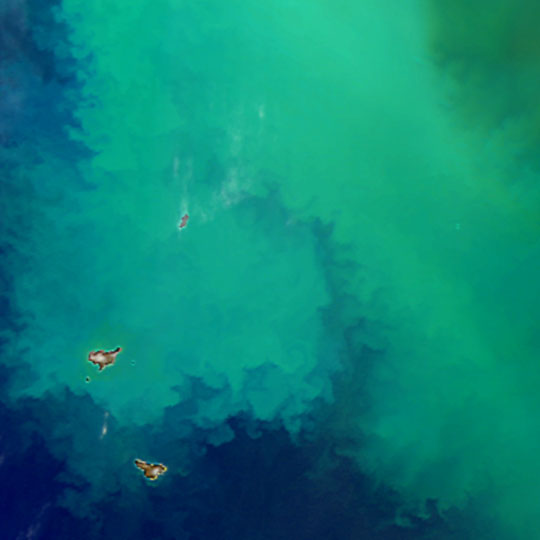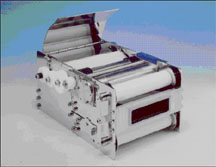

|
Training Course in Turkey The first announcement has been made for a training course on remote sensing of ocean
colour. The course will be held at the Middle East Technical University, Erdemli, Turkey, from 11-22 September, 2000. It will consist of lectures by specialists, practical hands-on sessions, and a one day cruise to demonstrate instrument deployment and protocols for validation of ocean-colour products from satellite data. The course content will emphasize applications relevant to the Black Sea region. It is intended for young graduate students and post-doctorals working in marine science and coastal-zone management. The course is sponsored by the NATO Science for Peace Sub-Programme, the International Ocean-Colour Coordinating Group (IOCCG), the Middle East Technical University and the Turkish Scientific and Technical Research Council (TUBITAK).
The first announcement has been made for a training course on remote sensing of ocean
colour. The course will be held at the Middle East Technical University, Erdemli, Turkey, from 11-22 September, 2000. It will consist of lectures by specialists, practical hands-on sessions, and a one day cruise to demonstrate instrument deployment and protocols for validation of ocean-colour products from satellite data. The course content will emphasize applications relevant to the Black Sea region. It is intended for young graduate students and post-doctorals working in marine science and coastal-zone management. The course is sponsored by the NATO Science for Peace Sub-Programme, the International Ocean-Colour Coordinating Group (IOCCG), the Middle East Technical University and the Turkish Scientific and Technical Research Council (TUBITAK).Participants will be drawn principally from countries surrounding the Black Sea and eastern Mediterranean region, but a few additional spaces are available for students from North Africa and the Middle-East. The submission deadline is July 1st. More details about the course are available on our website. SeaWiFS image of Turkey and region provided by the SeaWiFS Project, NASA/Goddard Space Flight Center, and ORBIMAGE
Earth Observatory Articles  The excellent Earth Observatory website
has several ocean-colour related sections to the website. Included are SeaWiFS
images of the Bering Sea showing large coccolithophore blooms, and also a comprehensive article on the subject,
Changing Currents Color the
Bering Sea a New Shade of Blue.
The excellent Earth Observatory website
has several ocean-colour related sections to the website. Included are SeaWiFS
images of the Bering Sea showing large coccolithophore blooms, and also a comprehensive article on the subject,
Changing Currents Color the
Bering Sea a New Shade of Blue.Image provided by the SeaWiFS Project, NASA/Goddard Space Flight Center, and ORBIMAGE.
New Plankton Recorder  The Autonomous Plankton Sampler is the result of a collaborative venture between the
Centre for Coastal Marine Science and Chelsea Instruments to design and develop a new
versatile, low-cost plankton sampler mechanism. It provides a modern replacement for
traditional sampling mechanisms such as that used in the Continuous Plankton Recorder
(CPR) programme of the Sir Alister Hardy Foundation for Ocean Science (SAHFOS).
The Autonomous Plankton Sampler is the result of a collaborative venture between the
Centre for Coastal Marine Science and Chelsea Instruments to design and develop a new
versatile, low-cost plankton sampler mechanism. It provides a modern replacement for
traditional sampling mechanisms such as that used in the Continuous Plankton Recorder
(CPR) programme of the Sir Alister Hardy Foundation for Ocean Science (SAHFOS).The system is intended to meet future requirements of sampling programmes, whilst maintaining backward data compatibility with the 60-year time series of the CPR and other long-term monitoring programmes. The sampler sensor suite is optimised to meet the requirements of programmes such as GOOS, EuroGOOS, the Large Marine Ecosystems (LME) programme and the US National Marine Fisheries Service. The Graphical User Interface (GUI) is a 32-bit Windows application used to programme the controller. Error detection is used on all data transfers. The plankton sampler screen allows the operator to set the frame advance rate based on either time, chlorophyll-a or flow.
In addition, Chelsea Instruments has received a Smart Award from the UK's Department
of Trade & Industry for a development study into a plankton bloom detector.
On receiving the award, Richard Burt, Marketing Director at Chelsea
Instruments said, "The aim of the project is to design an instrument to monitor
developing aquatic algal activity and predict the onset of a
phytoplankton bloom. Environmental organisations and those with specific
responsibility for monitoring water quality and providing potable water need
to have the capability to forecast when a bloom is going to occur and in sufficient
time scales so that actions to limit the effect can be taken. There is nothing
available at the moment to detect the onset of a phytoplankton bloom". For more information visit the Chelsea Instruments homepage.
|
IOC Announces e-Library On May 17th, the Intergovernmental Oceanographic Commission (IOC) announced that it had launched its new e-Library, providing instant access to its hundreds of publications. All new publications will be available for download and online viewing. The new site is available at http://ioc2.unesco.org/iocpub/.
Software updates The IOCCG software page is going to be changed in the near future. In the meantime, two links to software have been added, one for the calculation of SSI and PAR from SeaWiFS data; the other an image analysis and visualization package (WIM).
Workshops, Conferences and An update to the "2001: An Ocean Odyssey" conference to be held in Mar del Plata, Argentina from October 21-28, 2001 has been made. Abstracts may now be submitted online, the deadline for submissions is February 28th, 2001. All of the information on submissions can be found on the meeting website, which has also been updated with information on symposia, special events and scientific tours. The 2001 AVIRIS (Airborne Visible InfraRed Imaging Spectrometer) Earth Science Workshop is planned for February 6 to 9, 2001 at the Jet Propulsion Laboratory in Pasadena, USA. More details will be posted shortly on the AVIRIS website.
ERS - ENVISAT SYMPOSIUM - Looking down to Earth in the New Millennium,
Gothenburg, Sweden, 16 - 20 October 2000 For a more detailed list of workshops refer to our workshop page, and for training courses, our training page.
The IOCCG Latin American Forum mailing list has been updated. Now all Latin American Forum users can communicate with each other via the IOCCG server. The first step is to subscribe to the Forum by sending a blank e-mail to subscribe-latin@ioccg.org. Once subscribed, any member of the group can send a message to the rest of the group by sending an e-mail to latin-forum@ioccg.org, and also by replying to mail received. The list already has some members, however if you are unsure as to whether you are on the list or not, subscribe! If you have any questions about the Latin Forum, e-mail us.
References The current publications page was updated with a number of new papers on May 24th. To go to the new references page, click here. The bibliography pages have also been updated.
Employment updates A number of new jobs, in Plymouth, England have been posted on the employment page; a post-doctoral position in Canberra, Australia has also recently been added.
|
|
Material for possible inclusion in the IOCCG Newsletter should be submitted to the Project Scientist. If you would like to be placed on the IOCCG News mailing list, and receive a brief summary of the latest news by e-mail (approximately once every 2 months), please send an e-mail with 'subscribe' in the subject line to subscribe@ioccg.org.To unsubscribe from the IOCCG News mailing list please send a message with 'unsubscribe' in the subject line to unsubscribe@ioccg.org.
|
|
|
|